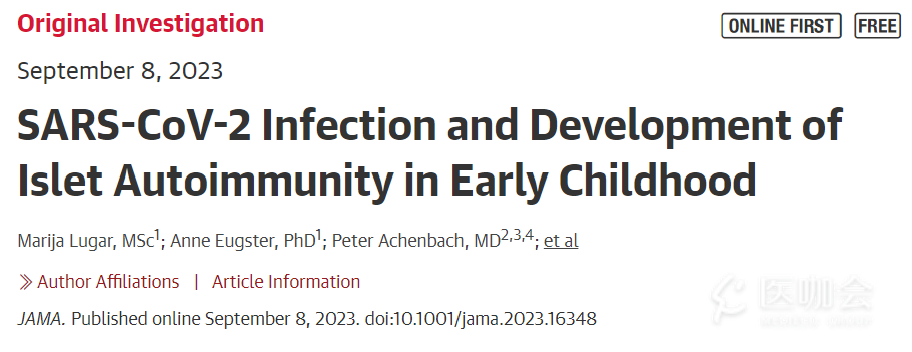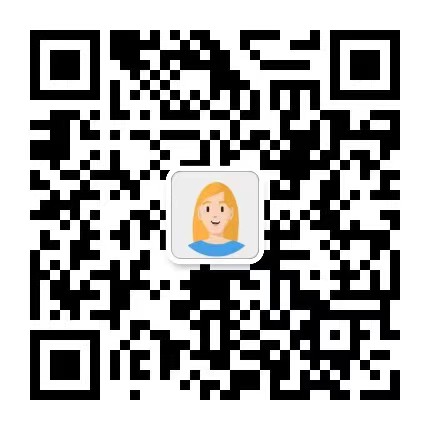JAMA:SARS-CoV-2感染与儿童早期胰岛自身免疫的发展
本文由小咖机器人翻译整理
期刊来源:JAMA
文献发表时间:2023-09-08
原文链接:https://jamanetwork.com/journals/jama/article-abstract/2809621
关键点内容如下:
问题
SARS-CoV-2感染与儿童1型糖尿病相关自身免疫的发展之间是否存在时间关联?
调查结果
在这项纵向队列研究中,885名1型糖尿病遗传风险升高的婴儿中,在检测到SARS-CoV-2抗体的同时或之后不久,胰岛自身抗体的发生率为7.8/100人-年,而在未检测到SARS-CoV-2抗体的儿童中为3.5/100人-年,差异显著。
意义
在1型糖尿病遗传风险高的幼儿中,SARS-CoV-2感染与胰岛自身抗体的产生暂时相关。
摘要内容如下:
重要性
在COVID-19大流行期间,儿童糖尿病的发病率有所增加。阐明SARS-CoV-2感染是否与1型糖尿病发病前的胰岛自身免疫相关,与疾病病因和未来儿童糖尿病趋势相关。
目的
确定SARS-CoV-2感染与儿童早期胰岛自身免疫发展之间是否存在时间关系。
研究设计和参与者
在2018年2月至2021年3月期间,欧洲多中心研究“初级口服胰岛素试验”(Primary Oral Insulin Trial)招募了1050名4至7个月的婴儿(517名女孩),这些婴儿患1型糖尿病的遗传风险超过10%。对儿童的随访一直持续到2022年9月。
暴露
从2018年4月到2022年6月,每隔2到6个月进行一次随访,直到2岁,通过SARS-CoV-2抗体的产生确定SARS-CoV-2感染。
主要结果和措施
随访中连续样本中多个(≥2个)胰岛自身抗体或单个胰岛抗体与1型糖尿病的发展。分析抗体发生率及发生胰岛自身抗体的风险。
次要结果
885名(441名女孩)儿童获得同意,从6个月开始随访抗体测量。170名儿童产生了SARS-CoV-2抗体,中位年龄为18个月(范围6-25个月)。60名儿童出现胰岛自身抗体。这些儿童中有6人在SARS-CoV-2抗体检测呈阳性的同时胰岛自身抗体检测呈阳性,有6人在就诊时SARS-CoV-2抗体检测为阳性。当儿童SARS-CoV-2抗体检测阳性时,发生胰岛自身抗体的性别、年龄和国家调整后的风险比为3.5(95%CI,1.6-7.7;P=.002)。无SARS-CoV-2抗体儿童的胰岛自身抗体发生率为3.5(95%CI,2.2-5.1)/100人-年,有SARS-CoV-2抗体儿童的发生率为7.8(95%CI,5.3-19.0)/100人-年(P=.02)。有SARS-CoV-2抗体的儿童的胰岛自身抗体风险与较小的年龄(<18个月SARS-CoV-2抗体发展的)(HR,5.3;95%可信区间为1.5~18.3;P=.009)。
结论和相关性
在1型糖尿病遗传风险高的幼儿中,SARS-CoV-2感染与胰岛自身抗体的产生暂时相关。
英文原文如下:
Key Points
Question Is there a temporal association between SARS-CoV-2 infection and the development of type 1 diabetes–associated autoimmunity in children?
Findings In this longitudinal cohort study of 885 infants with an elevated genetic risk of type 1 diabetes, the incidence rate of islet autoantibodies developing concurrently with or soon after SARS-CoV-2 antibodies were detected was 7.8 per 100 person-years and was 3.5 per 100 person-years in children without SARS-CoV-2 antibodies, a significant difference.
Meaning In young children with high genetic risk of type 1 diabetes, SARS-CoV-2 infection was temporally associated with the development of islet autoantibodies.
Abstract
Importance The incidence of diabetes in childhood has increased during the COVID-19 pandemic. Elucidating whether SARS-CoV-2 infection is associated with islet autoimmunity, which precedes type 1 diabetes onset, is relevant to disease etiology and future childhood diabetes trends.
Objective To determine whether there is a temporal relationship between SARS-CoV-2 infection and the development of islet autoimmunity in early childhood.
Design, Setting, and Participants Between February 2018 and March 2021, the Primary Oral Insulin Trial, a European multicenter study, enrolled 1050 infants (517 girls) aged 4 to 7 months with a more than 10% genetically defined risk of type 1 diabetes. Children were followed up through September 2022.
Exposure SARS-CoV-2 infection identified by SARS-CoV-2 antibody development in follow-up visits conducted at 2- to 6-month intervals until age 2 years from April 2018 through June 2022.
Main Outcomes and Measures The development of multiple (≥2) islet autoantibodies in follow-up in consecutive samples or single islet antibodies and type 1 diabetes. Antibody incidence rates and risk of developing islet autoantibodies were analyzed.
Results Consent was obtained for 885 (441 girls) children who were included in follow-up antibody measurements from age 6 months. SARS-CoV-2 antibodies developed in 170 children at a median age of 18 months (range, 6-25 months). Islet autoantibodies developed in 60 children. Six of these children tested positive for islet autoantibodies at the same time as they tested positive for SARS-CoV-2 antibodies and 6 at the visit after having tested positive for SARS-CoV-2 antibodies. The sex-, age-, and country-adjusted hazard ratio for developing islet autoantibodies when the children tested positive for SARS-CoV-2 antibodies was 3.5 (95% CI, 1.6-7.7; P = .002). The incidence rate of islet autoantibodies was 3.5 (95% CI, 2.2-5.1) per 100 person-years in children without SARS-CoV-2 antibodies and 7.8 (95% CI, 5.3-19.0) per 100 person-years in children with SARS-CoV-2 antibodies (P = .02). Islet autoantibody risk in children with SARS-CoV-2 antibodies was associated with younger age (<18 months) of SARS-CoV-2 antibody development (HR, 5.3; 95% CI, 1.5-18.3; P = .009).
Conclusion and relevance In young children with high genetic risk of type 1 diabetes, SARS-CoV-2 infection was temporally associated with the development of islet autoantibodies.
医咖会员已正式上线,点击链接https://new.mediecogroup.com/user/vip/categories/,查看会员12项权益!





